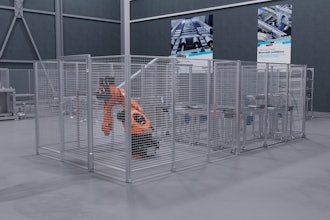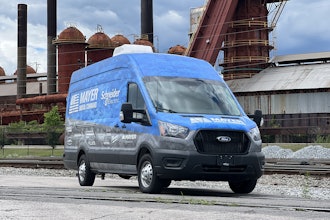"Ruggedish” smartphones is a global trend – and traditional rugged computer makers are best equipped to supply truly rugged smartphones and tablets
The large cell phone and computer manufacturers are increasingly launching smartphones and other mobile devices that are rugged, or rather “ruggedish”. Handheld’s founder and CEO Jerker Hellström takes a look at the reasons for this trend and where it might leave the traditional rugged computer makers. He also explains what rugged really means.
Many large mobile phone and computer makers are scrambling to make their devices more rugged, not only for field workers but also for the mass consumer market. For instance, it has been hard to not notice Sony’s strong promotion for its waterproof Xperia Z model, or Samsung’s recent launch of the waterproof and dustproof Galaxy X4 Active. Even your trusted and delicate iPhone can become water-resistant with one of the increasingly popular smartphone cases.
Before we jump to the conclusion that rugged laptops, tablets and smartphones have become mainstream, let me point out that most smartphones and mobile computers that are being sold are still not rugged in any aspect. Drop your ordinary smartphone in the water, or anywhere else for that matter, and you will most likely end up with a cracked display or a trip to the nearest phone shop for a new phone.
More importantly, the waterproof devices that cell phone makers launch are not truly rugged or ruggedized. Let us call them “ruggedish”. They might be waterproof but lack other aspects of ruggedness, like the ability to function well in low or high temperatures.
Let us briefly recap the definition of ruggedness:
- The devices should have passed some of the MIL-STD tests, i. e. the American military standard for equipment. 24 laboratory test methods ensure that the equipment can handle low pressure at high altitudes; exposure to high and low temperatures plus temperature shocks; rain; humidity; sand and dust exposure; leakage; shock and vibration
- They must be highly rated on the ingress protection (IP) scale for protection against dust and liquids. The ratings are displayed as a 2 digit number. The first digit reflects the level of protection against dust and the second digit reflects the level of protection against liquids (water)
Many of the new ruggedish smartphones launched by the big cell phone makers have high IP ratings, but seldom as high as the truly rugged smartphones offered out by traditional rugged computer makers. And hardly any of them are tested for 810G standards. So they do not handle extreme temperatures, drops or vibrations very well. They might be water resistant but are not shock resistant, you might say.
What are the reasons for this new ruggedish trend? I think that basically it comes down to the huge success of the smartphones and of mobility in general. People carry their smartphones or tablets everywhere, are constantly online, and want their devices to work also when they are jogging in the rain or dancing in a crowded bar. They also keep dropping them. The cracked display is a common sight these days. Bigger smartphones, or phablets, are harder to slide into your pocket or purse and more likely to end up on the floor.
Traditional rugged computer makers are best equipped to supply truly rugged smartphones and tablets
So the traditional truly rugged segment of the mobile computer and smartphone market is growing and becoming more attractive to the mass market, and the mass producers of smartphones are manufacturing more ruggedish devices. We have a convergence here. Where will it leave the often small specialized rugged computer manufacturers?
Traditional truly rugged mobile computer manufacturers, companies like Itronix, Trimble and Handheld, have for decades been churning out truly rugged devices. Ruggedness is “in their DNA”, as they often claim. Are the large smartphone manufacturers now invading their domain?
I think not. On the contrary, I think that a new focus on consumers’ need for durable products will benefit the rugged mobile computer industry since they are best equipped to make truly rugged devices. The professional field worker will stick with the products from the specialist rugged mobile computer makers simply because the products are so much better – a ruggedish smartphone will not be able to handle the tough working environments that field workers experience.
For field professionals and their employers, there is also the question about reliability and the cost of downtime. They simply cannot afford to lose valuable productive time because of hardware malfunctions. If a rugged mobile computer is business critical, they will not choose a ruggedish computer.
Other reasons why the traditional rugged computer makers still have a strong position:
- It is very difficult to design and manufacture rugged mobile computers. It takes a lot of competence and experience that is not easy to acquire.
- Life cycle management: the rugged computer makers have a longer perspective on the products and often offer five-year support and service plans. Their focus is for the products to last for many years, regardless of fashion.
- The rugged computer makers choose components with long life cycles, and the components are designed for industrial use (which increases performance and longevity).
- There is an attractive ecosystem of accessories – vehicle cradles, chargers, docks, carry cases etc, many from independent suppliers.
- The rugged computer makers have an existing sales and marketing network to distribute rugged mobile computers to the desired target groups.
- The rugged computer makers have existing and comprehensive service and support plans, which enable customers to speedily and cost-efficiently repair damaged smartphones and computers for several years after the purchase.
In conclusion: the trend towards more rugged computers is good for everyone. There is definitely room for the traditional cell phone manufacturers to offer more durable products the mass market. But the truly specialized rugged computer makers will still be best equipped to supply truly rugged computers to everyone.
Jerker Hellström is the founder and CEO of Handheld, a fast-growing manufacturer of rugged mobile computers, PDAs and smartphones. He is a pioneer and industry veteran in the mobile rugged computer industry. In both entrepreneurial and managerial positions, he has more than 25 years of experience from developing, designing, manufacturing and marketing rugged computers globally. Jerker´s educational background is in engineering and computer science.






















